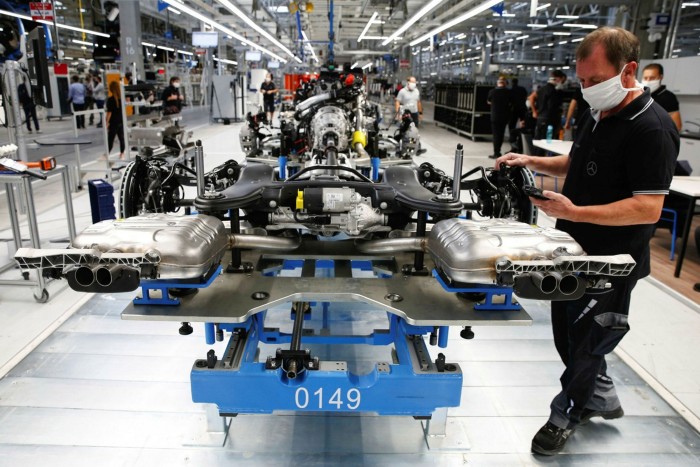Wirecard harmed more than duped investors when it collapsed into insolvency in 2020. The former high-flying start-up was one of just 30 blue-chip companies on Germany’s Dax index, having replaced Commerzbank two years prior, and its spectacular downfall cast a pall on the remaining members of this elite club.
Partly in response to this public relations crisis, Deutsche Börse Group, the Dax’s operator, decided it was high time to give the 32-year-old index a makeover. It launched a consultation, asking hundreds of companies and financial institutions what they would like to see changed.
The suggestions ranged from adding environmental and governance criteria to allowing into the index certain weapons manufacturers which are currently banned.
Ultimately, Deutsche Börse decided on a less controversial path. From mid September 2021 the Dax will expand from 30 to 40 of the biggest public companies by market capitalisation.
A new profitability requirement will also be introduced: to be eligible, businesses will have to post two years of positive earnings before interest, taxes, depreciation and amortisation.
Lossmaking companies such as the Wirecard replacement Delivery Hero will consequently find it harder to ascend to the top flight, although the new rules will not apply to existing members.
Large shareholders have cheered the moves. “The new rules come as a long-awaited modernisation for Germany’s most influential equity index,” said Jürgen Hackenberg, head of equities at institutional investor Union.
The expansion, he added, would allow younger companies with more potential to grow into the Dax, and “as a result, the index will reflect Europe’s largest economy in a better way”.
The old Dax was hardly an underperformer. Investors who entered at the index’s inception in 1988 would have seen an average annual return of 8.6 per cent, excluding dividends. An initial investment of €1,000 would now be worth €15,887.
By comparison, investors in the S&P 500 over the same period would have benefited from an average 9 per cent return a year, excluding dividends. While those in the FTSE 100 would have only seen their stakes go up by 4.3 per cent a year.

But although the make-up of the index has evolved from being heavily weighted towards banks and chemicals companies, to a more broad mix of automakers, industrial groups and pharmaceuticals, there is only one pure software company on the Dax: SAP.
Newer, innovative businesses are among those seeking promotion when the market capital rankings of Dax 40 contenders are assessed on September 3.
Online clothing retailer Zalando looks likely to have booked its place in the revamped Dax, alongside meal-kit provider Hello Fresh.
Some age-old niche expertise — in the form of Symrise, which provides flavouring and scents for tens of thousands of everyday foods and products — will also bring colour and variety to the index.
But taken as a whole, the Dax 40 will not necessarily be a model of corporate diversity. Fourteen of the prospective constituents are essentially six companies that have split into fragments.
There are already two Fresenius arms on the index, both part of one healthcare group. Industrial business Siemens is likely to be joined by two of its recent spin-offs, Siemens Healthineers and Siemens Energy, while Infineon, a former Siemens company, will also remain.
Chemicals company Covestro, a spin-off of longstanding blue-chip Bayer, will avoid relegation for now. Daimler, which is splitting into Mercedes and Daimler Trucks companies later this year, will probably occupy two spaces in time, and Porsche SE, the investment vehicle that owns a majority of Volkswagen, is likely to sit alongside the carmaker in the Dax 40. Deutsche Post and Deutsche Telekom — already Dax constituents — were both created by the privatisation of Deutsche Bundespost in 1995.
“[The index] will hardly change its character due to the addition of 10 stocks,” said Joachim Schallmayer, the head of capital markets at institutional investor Deka. The more important alteration, he said, was a more regular review of Dax membership that will refresh the index twice rather than once a year.
Those promoted to Germany’s most prestigious index later this week — the new index will begin trading later in the month — can expect their share prices to benefit from increased investments, especially from funds set up to buy shares in the Dax as a whole. They will also enjoy more publicity and press coverage.

“Belonging to the Dax after 20 years . . . would be a fantastic booster for our employees, for the recognition of the brand,” said Thierry Bernard, the boss of diagnostics company Qiagen, which is among the contenders.
Joachim Kreuzburg, the chief executive of another candidate, Sartorius, said that being listed on the Dax would “not affect our business”, but “would demonstrate the increasing relevance of the biotech and life science industries and put Sartorius even more in the public eye”.
However, some feel Deutsche Börse should have required more from new members, especially in regard to corporate governance rules.
Dax entrants will not have to endure any boardroom upheaval, according to Christian Strenger, the former chief of German asset manager DWS who has become a prominent corporate governance advocate.
“A simple audit committee is now required by law in any case,” he said of one of the only new governance requirements. “They should have at least upgraded this, and said the majority of the supervisory board should be independent, and particularly the chair of the audit committee.”
The mandate that companies in consideration for the Dax 40 post two consecutive years of positive ebitda “is too far away from real profitability”, Strenger said.
“It is a missed opportunity in many ways.”
https://news.google.com/__i/rss/rd/articles/CBMiP2h0dHBzOi8vd3d3LmZ0LmNvbS9jb250ZW50LzI5N2EzNWE4LWRmMzctNDA5MS1hMjgzLTE5MTRjZGJkM2U4YdIBAA?oc=5
2021-09-02 03:00:26Z
CAIiEIXjlzMKbAKw3nI4d-NC_wcqGAgEKg8IACoHCAow-4fWBzD4z0gw_fCpBg
Tidak ada komentar:
Posting Komentar